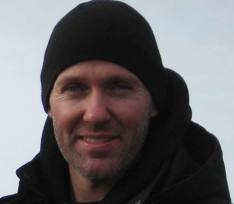Q&A with director Eddie Martin
 The director of All This Mayhem on making a film charting the rise and fall of skateboarding legends, brothers Tas and Ben Pappas.
The director of All This Mayhem on making a film charting the rise and fall of skateboarding legends, brothers Tas and Ben Pappas.
How did you get involved with the project?
When I was a kid I used to skateboard at Prahran and I knew the Pappas brothers who skateboarded there. I made two previous docos and then prior to Ben’s death, I would see him occasionally. I was kind of around even when he died. I was always present but it just didn’t feel right making the film at the time because I knew all of the people involved and it was such a raw wound. It felt wrong to attack it even though people had said to me, ‘you should do it, you should do it’.
A bit of time had passed and then someone else tried to make a documentary about the brothers. They approached the family. The family said no but they were still going ahead with it. It just felt really exploitative. At that point a couple more people were involved in our project and said, ‘we’ve got to do this’.
How long did it take to bring it all together?
It took three years but I always felt it had momentum, I always felt like things were happening with it.
First thing we did was we started chatting to cast and the family and making sure that if we did do it we could do it right. Once we had all of that happening, when Tas was cool for us to start moving ahead, that’s when we started development and getting into the finance.
Can you talk about the budget and pulling together the funds to make the film?
As usual with documentaries, it’s very tough at first because there’s time critical elements that you need to cover.
You essentially self-finance up until the point you are financed. We did really struggle to get development support on this project.
How would you describe the film for people who are yet to see it?
It’s a story about two brothers that just happen to be in the world of skateboarding. People can get so easily put off and I think that the skateboarding element will be our biggest challenge.
We didn’t want to use a skate image as our promo because obviously, for us, this isn’t a story about skateboarding.
Tell us about the film’s connection to the documentary Senna and the involvement of Vice Films.
One of our producers, James Gay-Rees, and the editor, Chris King, worked on both Senna and Exit Through the Gift Shop. To have their experience applied to our film and work alongside them was really a dream.
Vice Films have been the perfect fit for our film. They came on board with some finance that we needed and have been really supportive. That happened through one of our EP’s, Ken Marshall. He had some connections at Vice and got the ball rolling.
The film was largely assembled from archival footage which must have come with some interesting challenges and surprises.
Growing up in skating I knew it was a really video-centric culture so I knew footage would exist but obviously it’s a hard process to get people to dig it out. I know there was a similar thing when they did Exit Through the Gift Shop. It’s different when you’re in subcultures. You’re not dealing with professional organisations, you’re dealing with kids or people who have filmed stuff and it’s kind of in their garages. It’s on old formats. They’ve got all these old tapes that don’t have a camera anymore but they still hold onto a bunch of tapes. It was a really huge process. We had footage trickling in right until the end.
Can you describe the way the film was assembled?
It is a new form of storytelling that really has been started by these guys in the UK with Exit Through the Gift Shop and especially Senna where you’re taking a documentary form but you’re applying traditional dramatic storytelling techniques to it. I am a big documentary follower and it’s really exciting that this form of making docos has evolved over the past couple of years. That’s why I was thrilled to get the opportunity to work with some of the guys that were on the forefront of it.
What’s it like making such a personal film about such a sensitive topic?
It’s really important to do the right thing by your subjects and make sure that they’re okay with everything you’re putting in there before you put it out. Before the premiere screening, the cast had seen the cut so they knew what to expect and there weren’t any nasty surprises in there for them.
It was awesome because it was the first time they had seen it on the big screen with an audience and their reactions, especially for Tas, were amazing. So many people came up and approached him and were like, ‘Wow, thank you for sharing your story.’ That was a really fantastic experience for him.
What are the release plans for the film?
The film is to be distributed by Hopscotch in Australia. We are hoping the film will play at some festivals before a national Australian release. To get an overseas sale would be our main goal. This is the kind of film we really hope that people will go and see.
 This piece first appeared in Encore. Download it now on iPad, iPhone and Android tablet devices.
This piece first appeared in Encore. Download it now on iPad, iPhone and Android tablet devices.

